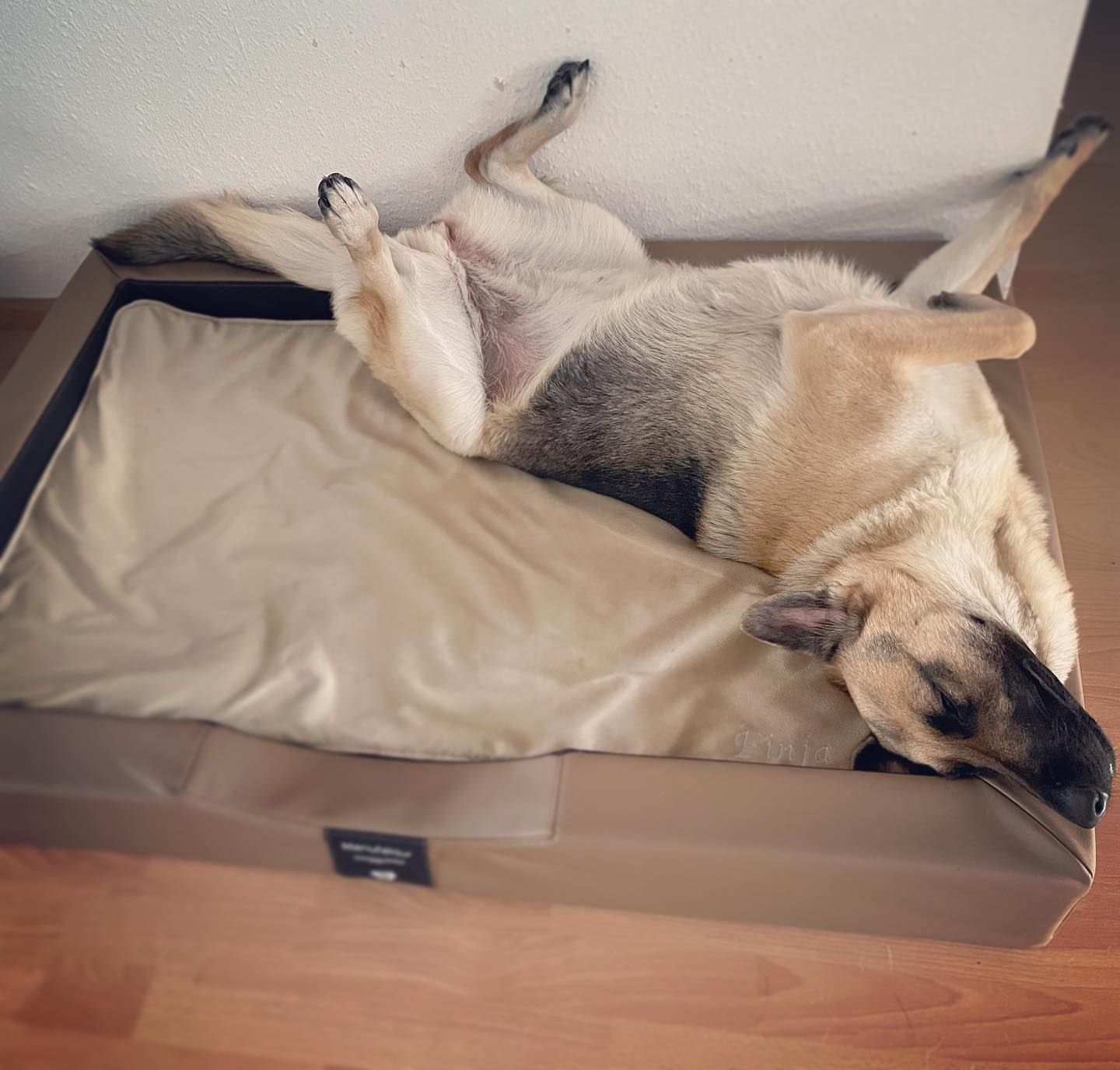The bond between humans and dogs is a remarkable and cherished one, filled with love, companionship, and countless joyful moments. However, as dog owners, we inevitably face the reality that our beloved canine companions will eventually reach the end of their lives. One common question and concern that often arise among dog owners is whether dogs die peacefully in their sleep. In this blog post, we aim to address this topic and provide information to alleviate fears and misconceptions surrounding the end-of-life process for dogs.
Understanding the end-of-life journey is an essential part of responsible pet ownership. By gaining knowledge and insight into the natural aging process and end-of-life signs in dogs, we can provide the best care, support, and comfort for our furry friends during their twilight years. It is crucial to dispel any myths or unrealistic expectations and approach this sensitive subject with empathy and understanding.
While the idea of dogs passing away peacefully in their sleep is comforting, the reality is often more complex. Dogs, like humans, may experience various health issues as they age, and the end-of-life process can manifest in different ways. Recognizing the signs and symptoms that indicate a dog is nearing the end of their life can help us prepare emotionally and make informed decisions regarding their care.

By shedding light on the natural aging process in dogs, the signs of approaching end-of-life, and the misconceptions surrounding dogs dying in their sleep, we hope to provide clarity and guidance to dog owners during this challenging time. It is our belief that understanding the end-of-life process is essential for ensuring our canine companions receive the care and support they deserve as they approach this final stage of their journey.
As we embark on this discussion, it is important to approach the topic with sensitivity and compassion. Our goal is to provide information that will alleviate fears, offer guidance, and empower dog owners to make informed decisions that prioritize the well-being and comfort of their furry friends. By understanding the end-of-life process for dogs, we can navigate this emotional time with greater understanding and provide the love and care our dogs need during their final days.
Let us now delve into the important aspects of the end of life process for dogs as we explore the signs considerations and care options that can help us navigate this inevitable part of our journey with our beloved canine companions.
You may like: Lavender Pomeranian

Understanding the Natural Aging Process in Dogs
As our beloved canine companions age, it’s important to recognize the natural aging process they go through and how it affects their overall health and well-being. In this section, we will explore the general aging process in dogs, common age-related health issues, and the significance of regular veterinary care.
Dogs just like humans experience physical and cognitive changes as they grow older the aging process varies based on factors such as breed size and overall health it s important to understand that aging is a natural progression and that our role as responsible pet owners is to provide support and care during this stage.
As dogs enter their senior years, they may encounter age-related health issues. These can include joint problems, such as arthritis, reduced mobility, vision and hearing impairment, dental issues, weight management challenges, and an increased susceptibility to certain diseases. Understanding these potential health issues can help us recognize and address them proactively.
Regular veterinary care and monitoring are vital for senior dogs routine check ups blood tests and other diagnostic measures can help detect age related conditions at their early stages early intervention and management can improve the quality of life for senior dogs and potentially extend their lifespan by working closely with a trusted veterinarian we can ensure our dogs receive the appropriate care and attention they need as they age.
You may like: Can dogs eat Grits?

End-of-Life Signs and Symptoms in Dogs
As dogs reach their final stages of life, they may exhibit specific signs and symptoms that indicate they are nearing the end. Recognizing these indicators is crucial for providing appropriate care and support. In this section, we will outline common end-of-life signs and symptoms in dogs and discuss their significance.
Decreased appetite is often one of the first signs noticed in dogs nearing the end of their life. They may show disinterest in their regular food or have difficulty eating. Lethargy and decreased energy levels are also common, as dogs may become more fatigued and spend increased amounts of time resting.
Changes in behavior can occur, such as increased anxiety, confusion, or restlessness. Dogs may withdraw from social interactions or seek more comfort and reassurance from their owners. Breathing difficulties can also arise, including shortness of breath or labored breathing. These signs may indicate underlying health issues or discomfort.

It’s important to note that every dog is unique, and individual circumstances and underlying health conditions can influence how they exhibit end-of-life signs. Some dogs may experience multiple symptoms, while others may only display a few. Monitoring your dog’s behavior, appetite, energy levels, and overall well-being can help you recognize when they are reaching the end stages of life.
You may like: Can Dogs Eat Hummus?
While it can be difficult to witness these signs, understanding and acknowledging them can guide us in making compassionate decisions regarding our dog’s care. Open communication with a veterinarian is crucial during this time to discuss options, assess the dog’s quality of life, and consider the best course of action based on their individual circumstances.
By being attentive to the signs and symptoms exhibited by our dogs, we can provide them with the support, comfort, and care they need during their final days. It’s a testament to the love and dedication we have for our furry companions, ensuring their well-being until the end.

Natural Death and the Sleep Scenario
It is a common misconception that dogs peacefully pass away in their sleep while it can happen it is not the most common scenario in this section we will address this misconception and explore the potential reasons why dogs may not pass away peacefully during sleep.
While the idea of our furry friends gently drifting away in their sleep may offer solace, the reality is often different. Dogs, like humans, can experience various health issues and discomfort as they age. Underlying health conditions, chronic pain, or discomfort can prevent them from peacefully passing away during sleep.
Age related conditions such as organ failure respiratory issues or cancer can affect a dog s overall well being and potentially lead to a more challenging end of life process dogs may experience symptoms such as difficulty breathing seizures or other distressing manifestations which can disrupt their sleep.
You may like: Is Diamond Dog Food Good For Pitbulls?
Additionally, it’s important to recognize that dogs are instinctively driven to protect themselves and their pack. As they sense their declining health or imminent passing, they may exhibit restlessness or seek comfort and reassurance from their owners. These behaviors are their way of communicating their needs and seeking support during their final stages.
Understanding these potential reasons can help us approach the end-of-life process with greater empathy and compassion. It is our responsibility as loving and caring owners to provide comfort, medical support, and a peaceful environment during this time. Open communication with a veterinarian is crucial for understanding and addressing any discomfort or pain our dogs may be experiencing.
Euthanasia as a Consideration
When faced with the decline in a dog s quality of life and increasing discomfort euthanasia can provide a humane and compassionate option to relieve their suffering in this section we will discuss the role of euthanasia in the end of life process for dogs and the importance of open communication with a veterinarian.
Euthanasia, which means “good death,” is a process in which a veterinarian administers medication to peacefully and painlessly end a dog’s life. It is a decision that is made out of love and respect for the well-being of our beloved companions when their suffering becomes too great to bear.
Open communication with a veterinarian is vital when considering euthanasia. They can provide guidance, assess the dog’s quality of life, and discuss available options. They will consider factors such as the dog’s overall health, pain level, ability to engage in daily activities, and prognosis. Together, you can make an informed and compassionate decision regarding the timing of euthanasia.

Assessing the quality of life is an important consideration when contemplating euthanasia. It involves evaluating factors such as the dog’s ability to eat, move, enjoy social interactions, and experience pain relief. Consulting with a veterinarian and honestly evaluating these aspects can help determine when euthanasia may be the most compassionate choice.
You may like: Why dog panting after vaccines?
It s essential to remember that euthanasia is not a decision to be taken lightly but is made with the best interest of the dog in mind it allows them to be free from suffering and ensures they pass away peacefully and with dignity
In the end, as responsible and caring owners, we must approach the end-of-life journey with empathy, understanding, and a commitment to providing the best possible care for our beloved dogs.
Conclusion:
In conclusion, understanding the natural aging process and end-of-life journey of our beloved dogs is essential for providing them with the care and support they need during this delicate stage. Throughout this blog post, we have explored the key aspects of the end-of-life process in dogs, debunked the misconception of dogs peacefully passing away in their sleep, and discussed the role of euthanasia as a compassionate choice.
We have emphasized the significance of recognizing the signs of approaching end-of-life in dogs, such as decreased appetite, lethargy, changes in behavior, and breathing difficulties. These indicators serve as a gentle reminder for us to be vigilant, observant, and proactive in monitoring our dogs’ well-being as they age.
It is crucial to dispel the misconception that dogs commonly die peacefully in their sleep. While it can happen, many dogs may experience discomfort or have underlying health conditions that prevent them from passing away peacefully during sleep. By understanding this reality, we can provide the necessary care, attention, and support they need during their final days.
Regular veterinary care and open communication with a trusted veterinarian are key elements in ensuring the well-being of our aging dogs. Regular check-ups, diagnostic tests, and early detection of age-related conditions allow for proper management and enhanced quality of life for our furry companions.
In cases where a dog’s quality of life deteriorates, and they experience significant pain or discomfort, euthanasia can offer a compassionate choice to relieve their suffering. Open communication with a veterinarian is crucial in making this decision, considering the dog’s overall well-being and quality of life.
Ultimately, it is our responsibility as loving and caring owners to prioritize the well-being of our furry companions throughout their lives, including the end-of-life stage. By approaching this sensitive topic with empathy, understanding, and a commitment to open communication, we can ensure that our dogs receive the love, support, and dignity they deserve during their final moments.
Let us remember the joy and cherished memories our dogs have brought into our lives by providing them with the best possible care making informed decisions and honoring their well being we can repay them for the unconditional love and companionship they have given us throughout their precious lives.






